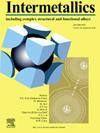On the calculation of the density of multi-component solid solutions
IF 4.8
2区 材料科学
Q2 CHEMISTRY, PHYSICAL
引用次数: 0
Abstract
In this paper, twelve methods that can be used to calculate the density of a multi-component solid solution are discussed. All the methods considered are mathematically simple and involve composition-weighted averages, sometimes with added corrections. Two of the density calculation methods discussed here are proposed for the first time and are innovative in using the polydispersity index of radii. The various methods have been tested by predicting the density of 60 multi-component solid solutions and comparing the value obtained with the density value reported (or calculated from their composition and lattice parameter) from papers found in the literature. The results may seem surprising, but they indicate that some (but not all) methods based on simple mixing laws can be very accurate. The more sophisticated methods also give good results (especially one of those proposed for the first time in this paper) and have the additional advantage of better explaining the underlying physics, which gives them additional value. Finally, expressions are proposed for calculating the various input parameters of the different methods so that there is consistency between them.

多组分固溶体密度的计算
本文讨论了十二种可用于计算多组分固溶体密度的方法。所有考虑的方法在数学上都很简单,并且涉及到成分加权平均,有时还会加上修正。本文讨论的两种密度计算方法是首次提出的,并且在使用半径的多分散性指数方面具有创新性。通过预测60种多组分固溶体的密度,并将所得值与文献中报告的密度值(或根据其组成和晶格参数计算的密度值)进行比较,对各种方法进行了测试。结果可能看起来令人惊讶,但它们表明,一些(但不是全部)基于简单混合定律的方法可以非常准确。更复杂的方法也会得到很好的结果(尤其是在本文中首次提出的方法之一),并且具有更好地解释底层物理的额外优势,这给它们带来了额外的价值。最后,提出了计算不同方法各输入参数的表达式,使其具有一致性。
本文章由计算机程序翻译,如有差异,请以英文原文为准。
求助全文
约1分钟内获得全文
求助全文
来源期刊

Intermetallics
工程技术-材料科学:综合
CiteScore
7.80
自引率
9.10%
发文量
291
审稿时长
37 days
期刊介绍:
This journal is a platform for publishing innovative research and overviews for advancing our understanding of the structure, property, and functionality of complex metallic alloys, including intermetallics, metallic glasses, and high entropy alloys.
The journal reports the science and engineering of metallic materials in the following aspects:
Theories and experiments which address the relationship between property and structure in all length scales.
Physical modeling and numerical simulations which provide a comprehensive understanding of experimental observations.
Stimulated methodologies to characterize the structure and chemistry of materials that correlate the properties.
Technological applications resulting from the understanding of property-structure relationship in materials.
Novel and cutting-edge results warranting rapid communication.
The journal also publishes special issues on selected topics and overviews by invitation only.
 求助内容:
求助内容: 应助结果提醒方式:
应助结果提醒方式:


